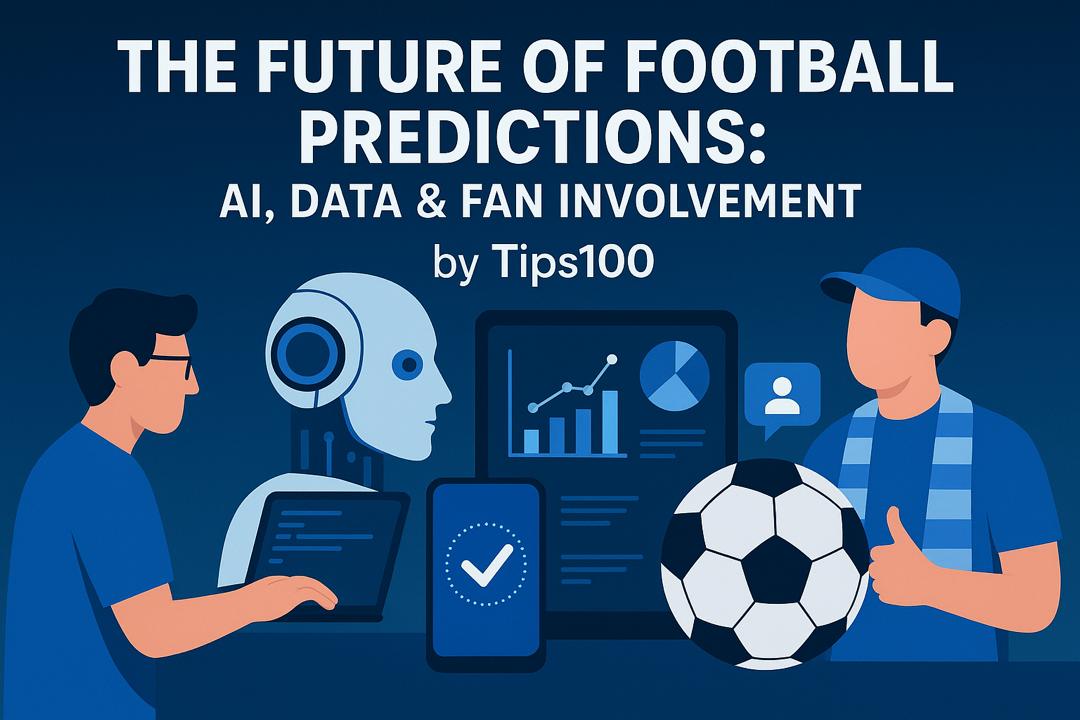Football predictions just like every other sport prediction, may seem like a game of just statistics, analysis, AI models, and odds, but in reality, psychology plays a great role in determining how predictions are made.
When bettors or fans predict an outcome of a game, they are not just analyzing numbers. Those analyses are greatly influenced by emotions, biases, loyalty, random pick, or just mere love for the club. That’s why two bettors can look at a game, and both forecast a different outcome for the same match.
That’s why an expert pro site like Tips100 was created, to show the importance of balancing human psychology, AI, with data driven predictions. By studying and understanding our own biases, we’re able to make smarter choices and avoid costly mistakes that can lead to losses.
In this article, we’ll explore:
• Why humans love making football predictions.
• The psychological biases that shape betting decisions.
• How emotions like hope and fear affect predictions.
• The clash between instinct and logic.
• How Tips100 helps fans predict smarter.
Why Do We Predict Football Matches?
1. The Need for Control
Football without the right guide can be unpredictable. Predictions give fans a sense of control over chaos.
2. The Thrill of Anticipation
Guessing who scores next or the outcome of the match makes watching more exciting.
3. Social Competition
Prediction games and contests let fans compete with friends or online communities which can be fun.
4. Potential Profit
Betting adds financial motivation to predictions.
In short: we predict football matches because it’s fun, competitive, and rewarding.
🧩 Psychological Biases in Football Predictions
Human thinking, to some extent, is not always logical. We tend to follow shortcuts, which will lead to biases. Here are the most common biases in football betting:
1. Recency Bias
• Overvaluing recent results, based on former winning. For example, If Arsenal win 5-0 last week, fans overestimate them in the next match.
2. Confirmation Bias
• Only looking for info that supports your belief. For Example, A Manchester United fan predicts wins even his team are not in form and the statistics suggest otherwise.
3. Overconfidence Bias
• Thinking you “know” football better than others. This act can lead to risky predictions without data. That’s why it’s better to use Tips100.com for all accurate predictions.
4. Availability Heuristic
• Judging based on memorable events. For Example, predicting another 7-2 Liverpool win over Aston Villa because it once happens in the past.
5. Gambler’s Fallacy
• Believing a losing streak must end soon. For Example, betting on Chelsea to win because you believe they can’t lose four games in a row.
6. Anchoring Bias
• Relying too heavily on the first piece of information you see. For Example, if odds open at 1.30, bettors assume it’s “fair” even after lineup changes.
🎭 The Role of Emotions in Football Predictions
1. Hope and Loyalty
• Fans tend to predict in favor of their favorite team to win the game, regardless of their form and match statistics.
2. Fear of Missing Out (FOMO)
• Betting on a certain game because the majority of people are betting on the same thing.
3. Regret Avoidance
• Avoiding bets to prevent the pain of losing or because it has lost a certain time in the past. even when the value is clear.
4. Euphoria After Wins
• After winning, bettors tend to take riskier bets, believing they’re “on form or luck is on their side.”
5. Frustration After Losses
• After losing a bet, it is advisable to relax and re-strategize because bettors like chasing losses with reckless predictions.
Emotions can cloud judgment, making it harder to predict accurately without data support.
⚖ Intuition vs Logic in Predictions
• Intuition (gut feeling): Fast, emotional, often biased.
• Logic (data-driven): Slow, analytical, based on evidence.
The best predictions are balancing both. For Example: Intuition says derbies are unpredictable, but logic shows home teams often win.
That’s why Tips100 combines AI models with expert analysis t which is the surest balance of logic and human insight.
Case Studies
Case Study 1: Leicester City 2016 Title–Most bettors consider Leicester unworthy to win the league title due to sentiment bias like them being small club, and the fact that they merely escaped relegation the last season. but a Few trusted the data was showing consistent performance.
Case Study 2: Brazil 1-7 Germany (2014 World Cup)– Recency bias favored Brazil, and Emotional bettors ignored Neymar’s injury which data clearly shows he was the pillar of the team then to bet on Brazil to win.
Case Study 3: Manchester United under Sir Alex Ferguson– Fans usually fall into confirmation bias, always backing United because of their past dominance, even when they know they’re in their transition years.
How to Outsmart Psychological Biases
1. Rely on Data, Not Emotion: That’s why it is advisable to use platforms like Tips100 for objective insights.
2. Diversify Predictions: Don’t always bet on your favorite team; if possible, it’s best to ignore it totally.
3. Track Your Bets: Review past mistakes to spot bias patterns.
4. Set Rules: Never bet on a game when you’re angry or overly excited.
5. Follow Expert Advice: Tips100 mixed AI + human analysis to reduce bias.
The Role of AI in Beating Human Bias
AI models have no loyalty or emotional thinking, all they can do is to only process data and give results.
Benefits of AI in predictions:
• Avoids recency and confirmation bias.
• Processes thousands of stats and data instantly.
• Adjusts to live game changes faster than humans.
However, AI isn’t perfect in football predictions, as it lacks human intuition for factors such as derby passion, rivalry motivation, managerial changes, or dressing room morale, which can alter the outcome of the game.
That’s why Tips100’s hybrid approach works best: Ai data + expert insight= daily accurate winnings.
Global Differences in Prediction Psychology
• Europe: Fans mostly rely on tradition and history (anchoring bias).
• Africa: Loyalty to favorite teams strongly influences predictions.
• Asia: Heavy reliance on statistical models, less emotional betting.
By blending data-driven forecasts with cultural awareness, Tips100 appeals to a global audience.
Why Tips100 Helps Beat Psychological Traps
Unlike emotional predictions, Tips100 provides structured and unbiased insights like:
• Daily free football predictions today.
• Coverage of 1X2, BTTS, Banker bet, Over/Under, double chance, and Correct Score markets.
• AI-driven stats with expert human analysis and guidance on everything you need to know about prediction, plus news on their blog.
• Focus on 100 sure football tips today for bettors seeking reliability.
The Future: Psychology Meets AI in Predictions
The future of smart prediction is already here, and the next stage of football predictions will combine:
• AI learning models with real-time fan sentiment.
• Behavioral analysis of how bettors react to odds.
• Custom predictions based on user psychology, like warning a fan against bias.
This future of football predictions we’re talking about means more accurate and personalized predictions.
Conclusion
Football predictions aren’t just about data and statistics; they involve how humans think and feel.
understanding psychological biases like recency, overconfidence, and loyalty, bettors can avoid common mistakes. And by combining logic with instinct and relying on Tips100’s unbiased free daily predictions, bettors stand the best chance of success every day.
In the end, predicting football is both a science and an art. Master the psychology, and you’ll not only enjoy the game more but also improve your winning potential.
📌 FAQs on Psychology of Football Predictions
1. Why do fans love predicting football matches?
Because it adds excitement, control, and competition to watching games.
2. What’s the biggest psychological mistake in predictions?
Recency bias—overvaluing the last result.
3. Can emotions ruin football predictions?
Yes, hope, fear, and frustration often lead to poor choices.
4. How do I avoid bias in my predictions?
Use data-driven platforms like Tips100 for objective analysis.
5. Is psychology more important than stats in football predictions?
Both matter in the game, but the best results come when psychology is balanced with data










